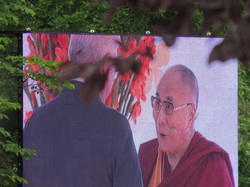
How Do Firms Respond to Political Tensions? The Heterogeneity of the Dalai Lama Effect on Trade
Faqin Lin, Cui Hu and Andreas Fuchs
Published in: China Economic Review 54: 73-93
Abstract
Little is known about the firm-level dynamics behind trade responses to political tensions. This article reinvestigates variation in the travel pattern of the 14th Dalai Lama to study how political tensions affect trading decisions of Chinese importers. Using monthly trade data from China Customs covering imports of machinery and transport equipment from 173 countries over the 2000-2006 period, our empirical results show a significant reduction of imports in response to foreign government members’ meetings with the Dalai Lama. In line with the idea that Chinese importers face a trade-off between bearing costs from suboptimal trade transactions and costs from not accommodating the government, this ‘Dalai Lama Effect’ operates at the intensive margin, i.e., via a decrease in the import volume per importer. Examining differential effects across types of firm ownership, we find that the observed effect is driven by state-owned enterprises (and foreign-invested firms) and not by private companies. Moreover, while direct importers temporarily reduce their trade with Dalai Lama-receiving countries, there is some evidence that trade intermediaries fill the void. Overall, we find the effects to be much more short-lived than previously thought.
Published paper
Working paper (December 2016)
Presentations at conferences and workshops
Faqin Lin, Cui Hu and Andreas Fuchs
Published in: China Economic Review 54: 73-93
Abstract
Little is known about the firm-level dynamics behind trade responses to political tensions. This article reinvestigates variation in the travel pattern of the 14th Dalai Lama to study how political tensions affect trading decisions of Chinese importers. Using monthly trade data from China Customs covering imports of machinery and transport equipment from 173 countries over the 2000-2006 period, our empirical results show a significant reduction of imports in response to foreign government members’ meetings with the Dalai Lama. In line with the idea that Chinese importers face a trade-off between bearing costs from suboptimal trade transactions and costs from not accommodating the government, this ‘Dalai Lama Effect’ operates at the intensive margin, i.e., via a decrease in the import volume per importer. Examining differential effects across types of firm ownership, we find that the observed effect is driven by state-owned enterprises (and foreign-invested firms) and not by private companies. Moreover, while direct importers temporarily reduce their trade with Dalai Lama-receiving countries, there is some evidence that trade intermediaries fill the void. Overall, we find the effects to be much more short-lived than previously thought.
Published paper
Working paper (December 2016)
Presentations at conferences and workshops
- Research seminar at Huazhong University of Science and Technology, China (05/2018)
- Research seminar at Wuhan University, China (04/2018)
- Research seminar at Sun Yat-sen University, Zhuhai, China (05/2017),
- Fifth Annual International Workshop on Economic Analysis of Institutions at Xiamen University, China (05/2017)
- Research seminar at Northwest University, Xi’an, China (10/2016)
- Research seminar at Jiangxi University of Finance and Economics, Nanchang, China (09/2016)
- Conference on Development, Trade and Investment at the Stockholm School of Economics, Stockholm, Sweden (08/2016)
- Workshop on Global Economic Governance in Transition at Brigham Young University, Provo, USA (01/2016)
- Research seminar at Nankai University, Tianjin, China (12/2015)
- Research seminar at Shanghai University of Finance and Economics, Shanghai, China (11/2015)
- Research seminar at Shanghai Jiao Tong University, Shanghai, China (11/2015)
- Research seminar at Hunan University, Changsha, China (06/2015)
- China Meeting of the Econometric Society at Xiamen University, Xiamen, China (06/2014)
- China Annual Conference of the International Economics and Finance Society China at the University of International Business and Economics, Beiing, China (05/2014)
- Research seminar at Peking University, Beijing, China (05/2014)
- Research seminar at Nanjing University, Nanjing, China (04/2014)
- Research seminar at Central University of Finance and Economics, Beijing, China (12/2013)
